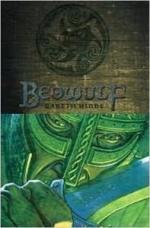{Grendel is unremitting in his persecutions.}
45 The monster
of evil fiercely did harass,
The
ill-planning death-shade, both elder and younger,
Trapping
and tricking them. He trod every night then
The
mist-covered moor-fens; men do not know where
Witches
and wizards wander and ramble.
50 So the
foe of mankind many of evils
Grievous
injuries, often accomplished,
Horrible
hermit; Heort he frequented,
Gem-bedecked
palace, when night-shades had fallen
{God is against the monster.}
(Since
God did oppose him, not the throne could he touch,[5]
55 The light-flashing
jewel, love of Him knew not).
’Twas
a fearful affliction to the friend of the Scyldings
{The king and his council deliberate in vain.}
Soul-crushing
sorrow. Not seldom in private
Sat
the king in his council; conference held they
What
the braves should determine ’gainst terrors unlooked
for.
{They invoke the aid of their gods.}
60 At the
shrines of their idols often they promised
Gifts
and offerings, earnestly prayed they
The
devil from hell would help them to lighten
Their
people’s oppression. Such practice they
used then,
Hope
of the heathen; hell they remembered
65 In innermost
spirit, God they knew not,
{The true God they do not know.}
Judge
of their actions, All-wielding Ruler,
No
praise could they give the Guardian of Heaven,
The
Wielder of Glory. Woe will be his who
Through
furious hatred his spirit shall drive to
70 The clutch
of the fire, no comfort shall look for,
Wax
no wiser; well for the man who,
Living
his life-days, his Lord may face
And
find defence in his Father’s embrace!
[1] The translation is based on ‘weras,’ adopted by H.-So.—K. and Th. read ‘wera’ and, arranging differently, render 119(2)-120: They knew not sorrow, the wretchedness of man, aught of misfortune.—For ‘unhaelo’ (120) R. suggests ‘unfaelo’: The uncanny creature, greedy and cruel, etc.
[2] S. rearranges and translates: So he ruled and struggled unjustly, one against all, till the noblest of buildings stood useless (it was a long while) twelve years’ time: the friend of the Scyldings suffered distress, every woe, great sorrows, etc.
[3] For ‘syethethan,’
B. suggests ‘sarcwidum’: Hence
in mournful words it
became well known, etc.
Various other words beginning with ‘s’
have
been conjectured.




